How the prices of essentials are manipulated
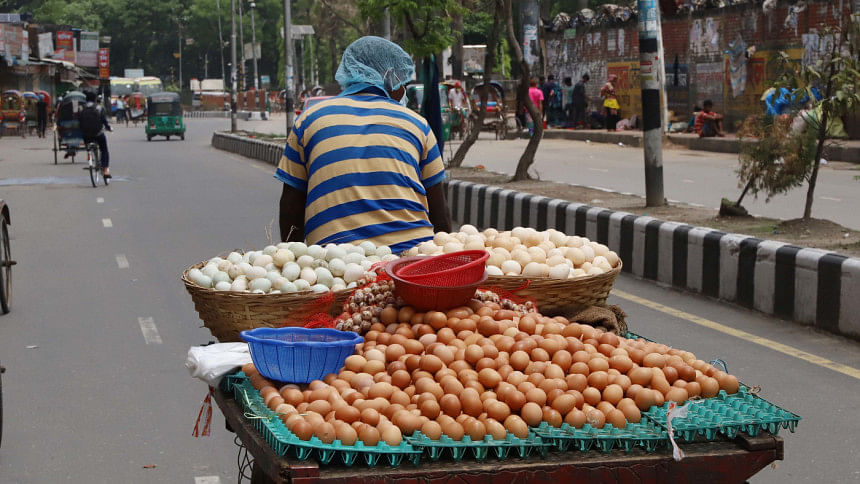
In a market economy, the price of a commodity is supposed to be determined by the market's "invisible hand," which refers to demand and supply. In Bangladesh, though, the invisible hand is not of the market but of some powerful businesses. This is true for both domestically produced and imported commodities. Given the present reality, let's look at how the price of eggs, which are produced domestically, is manipulated.
According to the Ministry of Fisheries and Livestock, the production cost of an egg should not exceed Tk 10.50, and the maximum retail price should not cross Tk 12. But our production cost itself is higher than the retail price of eggs in neighbouring India and Pakistan. In West Bengal, the price of an egg is Rs 5.33 (or Tk 7.50) and in Pakistan, a dozen eggs went for 294 Pakistani rupees as of August 17, which translates to roughly Tk 9 per egg. This indicates that, in Bangladesh, the costs of poultry feed and day-old chicks are higher, which are subject to the corporate control of a few big poultry farms.
Apart from this, the retail price of eggs is fixed well above the cost of production. Although small farmers produce 85 percent of eggs, middlemen, large markets, and big farms are playing a greater role in setting the price. Every morning, they inform farm-level producers about the price through SMS or Facebook groups, which the producers must comply with irrespective of their production cost, as eggs cannot be stored for long at farms. For example, North Egg and Kazi Farms jointly decide the price in Dinajpur. The farmers of Gazipur's Sreepur have to sell eggs every morning at the price set by traders in Dhaka. Farmers in Bhairab and Kishoreganj also rely on text messages sent from Dhaka for setting prices. Rajshahi Poultry Dealers Association declares the price of eggs in Rajshahi every day.
According to the Directorate of National Consumer Rights Protection (DNCRP), assuming that the daily demand for eggs in Bangladesh is four crore, dishonest traders make an additional profit of Tk 8-12 crore daily by hiking the price of each egg by Tk 2-3.
This mechanism of hiking prices is not new. According to a report by the DNCRP, in August last year, large egg-producing firms appointed agents to manipulate prices during auctions. But no action was taken against the perpetrators and, as a result, this kind of price manipulation is still the norm.
Another reason behind widespread manipulation is that the government does not have accurate and reliable data about the commodity's production and demand. As per the Department of Livestock Services, egg production is increasing every year; but according to a large private farm, production has declined by 14 percent in a year. An official of the Department, who did not want to be named, said that the accounts of the department are fabricated. The government cannot employ an advanced strategy due to lack of proper data. If it had known that there would be a shortage of eggs, it could have filled in the gaps by incentivising more production or imports. Amid all this, big businesses are taking advantage of the situation.
Even imports are mired in manipulation. The import of essentials is now almost entirely controlled by a few big businesses. They have established control at every stage of the import process through mutual cooperation, rather than competition based on market rules.
The market share of 17 daily commodities (including sugar, pulses, and oil) has been captured by a few big importers. For example, five companies – Deshbandhu, Abdul Monem, S Alam, Meghna, and City – mainly import raw sugar from abroad, then refine and sell it within the country. Four companies – TK, Meghna, City and S Alam – import 88 percent of edible oil. Big importers have colluded and created a situation wherein middle-level traders cannot buy the products according to their own preferences. If a trader wants to buy a product, they have to go to the importer, who will decide which product the trader can purchase from whom and at what price. Even if a trader wants to import products by himself or herself, the banks are unwilling to open an LC, government departments (including customs) create obstacles for the trader, and even lighter vessels would be unavailable to bring the commodities to the port. Even if the trader somehow manages to import the product, the big businesses would start selling it at a lower price, causing the trader to incur a huge loss.
The reasons why some large businesses can establish such extensive control over the market are that they 1) are major importers; 2) own or manage commercial banks, and/or 3) they or their associates own the lighter vessels. Even product dealerships are controlled by people connected with these large businesses.
By establishing complete control over the import and production of essential commodities, these businesses can decide all the variables, often under the pretext of domestic and international situations. They are the reason why prices of essentials like soybean oil, sugar, and lentils have not gone down in the domestic market though international prices have decreased significantly. They are the owners of the invisible hand. The names and identities of these businesses are not unknown to government officials; the commerce minister himself admitted the existence of this syndicate. When no action is taken against market manipulation, it is only natural for the people to wonder whose interests the government is protecting.
Kallol Mustafa is an engineer and writer who focuses on power, energy, environment and development economics.
Views expressed in this article are the author's own.
Follow The Daily Star Opinion on Facebook for the latest opinions, commentaries and analyses by experts and professionals. To contribute your article or letter to The Daily Star Opinion, see our guidelines for submission.

 For all latest news, follow The Daily Star's Google News channel.
For all latest news, follow The Daily Star's Google News channel. 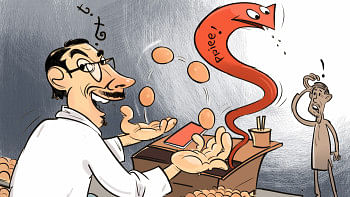
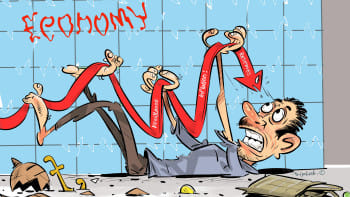



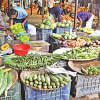

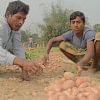



Comments